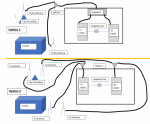Hello, I hope to get help on here for a few specific questions. Please excuse my ignorance on some items as I am still educating myself when I can on Radio knowledge. I am the safety manager for a relatively new company which is a peanut sheller in a rural community (we have been in business for about 1.5 years and I have been here for right at 1 year). As part of the tasks given to me, I need to establish a functioning radio communication network and do it as inexpensively as possible. At the previous place I worked we had Motorola CP-200 radios but mainly they worked inside the building and were not used for a large distance.
Background:
I have established a few things so for:
The structure of our facility is made of metal and sits on about 60 acres on a relatively flat, but sloping plain. The warehouse feeding the plant has an underground tunnel surrounded by several feet of concrete. We also have some very tall grain(peanut) elevators. I recognize that the area covered should possibly have a repeater.
Problem:
The 5 watt radios cover most of the area from the front offices to the plant with out too much issue, however, once you get past the plant the radio signal drops to heavy static or nothing at all. The tunnel gets no radio reception at all.
I got a quote on a repeater and it was WAY MORE than my company is able/willing to put out at this time. So I have been tasked with getting done a difficult, but I don't think impossible, task. I have come across a device that I believe will work well enough as a repeater for our "little" area. (here is a link to it on amazon-2 way repeater box). It consists of using 2 mobile radios linked by a box. We don't need a repeater that works for miles just enough to get a signal from the furthest corners of our property. So here is where I start asking the questions:
Here is a picture from the location where the antenna(s) will go.

Background:
I have established a few things so for:
- FCC license for 5 frequencies in the UHF frequencies 400-470 MHz
- Purchased and programed (18) 5 watt FPCN30A Samcom radios
- Purchased (6) 10 watt H-6 Tidradio (have not programed yet as they just arrived)
- I also have 3 other radios: (2) Baofeng UV-5R and (1) Baofeng BF-F8HP (I used these as test radios to determine what to get)
The structure of our facility is made of metal and sits on about 60 acres on a relatively flat, but sloping plain. The warehouse feeding the plant has an underground tunnel surrounded by several feet of concrete. We also have some very tall grain(peanut) elevators. I recognize that the area covered should possibly have a repeater.
Problem:
The 5 watt radios cover most of the area from the front offices to the plant with out too much issue, however, once you get past the plant the radio signal drops to heavy static or nothing at all. The tunnel gets no radio reception at all.
I got a quote on a repeater and it was WAY MORE than my company is able/willing to put out at this time. So I have been tasked with getting done a difficult, but I don't think impossible, task. I have come across a device that I believe will work well enough as a repeater for our "little" area. (here is a link to it on amazon-2 way repeater box). It consists of using 2 mobile radios linked by a box. We don't need a repeater that works for miles just enough to get a signal from the furthest corners of our property. So here is where I start asking the questions:
- When setting up a repeater, do the Tx and Rx frequencies both have to be from the FCC or is one frequency issued and then the user does an offset?
- In addition to the device above, I would like to use external antennas to Rx and Tx. Can I link 2 receiving antennas with a splitter going back to the Rx radio? Likewise, can I link 2 transmitting antennas with a splitter? See 2 options below. Which is more feasible? I need to try to cover the tunnel and the yard area with the same repeater.
- Does a duplexer have to be programed for the frequencies we have or can I program it myself if I need to order one? any suggestions on the best one to order?
- I want to mount the antenna to the highest point which will be about 75'-100' off the ground What type of antenna should I get, vertical or Yagi? Something else?
- I am looking at running about 100' of cable maybe more. What type of cable should I run from the radio to the antenna? RG-58, RG-6, RG-8x?
Here is a picture from the location where the antenna(s) will go.



